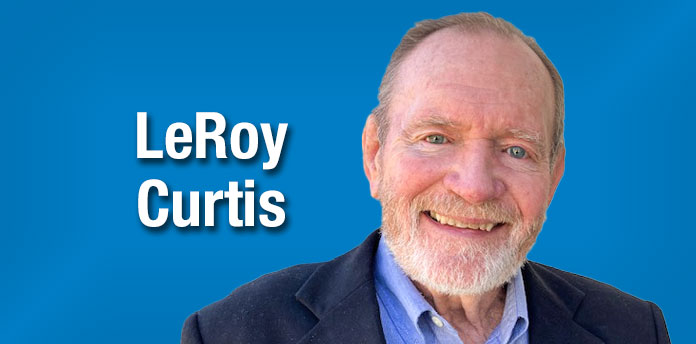Dear Friends, Happy New Year! Yes, a week in, I might be the very last person to extend that greeting. It’s especially ironic since one of my former and most sincere New Year’s resolutions was to finally end the tendency to procrastinate.
Life is riddled with ironies. That seems to get worse as advancing age and lots of experience overtake my optimism that anything is ever going to change. Is it “them” or is it me? It could be me.
The old metaphor that most “change” is merely re-arranging the deck chairs on the Titanic too often rings true. A little more of this and a little less of that works better over a stove than in the trenches of real life. On the other hand, fundamentally transforming everything we understand as being the context of reality can completely overwhelm our imagination, much less our ability to comprehend what that might look like.
Most of our resolutions, be they the New Year’s sort or not, usually run out of gas at nearly warp speed, even though we mean well. The Bible makes it clear that we are not nearly as strong in spirit as we think ourselves to be. Trying in the energy of our own inner strength has consistently failed us, and the frustration that follows makes our next effort to change even more feeble.
Embracing ourselves, accepting our obvious flaws without any sort of effort to improve, is essentially giving up altogether. Despair is the ultimate result.
My short semi-career in the construction industry taught me that occasionally you have to tear stuff down and start from scratch. As frustrating as that can be, sometimes it is our only recourse.
Most faulty foundations upon which we build our lives are created with mistaken certainties about life. An assumption that we have a firm grasp on what is what only sets us up for “epic fail.” Going back to the drawing board is necessary if we are serious about changing anything significant about ourselves.
One thing we learn for sure from the Law of the Old Testament, and certainly from the news media, is that human nature is hopelessly broken and in desperate need of salvation that will come only from God, Himself. However, through Jesus Christ believers are reckoned as righteous even though they are never quite “sinless.” Jesus already sees us in our redeemed state of being and invites us to enjoy our new life in Him.
There’s even better news: We not only accept His sacrificial death on the cross that secures forgiveness of sins, but also, we receive the Holy Spirit whom He sent to sanctify us, empower us, and lead us into all truth.
We’re not talking about mere self-improvement. It’s a whole new ball game! Christ in us, the hope of glory (Colossians 1:27) is a radical transformation that goes far beyond personal adjustment. It’s about becoming a new creature.
What, exactly, is transformation and how does it work? I thought you’d never ask. The root Greek word is “metamorphose.” As we learned in high school biology, metamorphosis is the process by which an animal, after being born, physically develops in a way that includes a conspicuous and abrupt change in its original form or structure. One of the more notable examples is the transition that occurs when a caterpillar changes into a butterfly. Transformation is a profound change in our most fundamental identity.
Both Colossians 3:10, and Ephesians 4:22-24 use a metaphor that refers to the changing of garments. The “old” carnal self is exchanged for the “new” spiritual self, resulting in a brand new creation in Christ (2 Corinthians 5:17). Romans 12:2 admonishes believers to stop conforming to the pattern of this world which teaches us to live self-referentially in ignorance of God and His word. Rather, we are to be transformed by the renewing of our minds.
In other words, our world view shifts from a self-servicing philosophy to the worship and service of the living God. This change comes through a process as we choose each moment to grow in grace. 2 Corinthians 3:18 states that through the Holy Spirit we are being transformed into Christ’s likeness day by day in order that we will eventually reflect the Lord’s glory. One day soon the Lord will complete the process when He returns in victory. Philippians 3:21 says that He will transform our lowly bodies so that they will be like His glorious body.
So, as I understand all this, our transformation begins when we receive the Holy Spirit, and the process continues until we die or the Lord returns. The Holy Spirit does the work as we submit ourselves to what He is doing in us. Personally, as the Holy Spirit empowers me, I am tearing up my own resolutions and fully submitting to God’s workmanship in me. I no longer want to be merely improved. I want to be transformed and conformed to Christ’s image.
True holiness, without which we are destined to fail in our efforts to be better people, comes through a transformation process whereby our sinful nature is gradually displaced by a redeemed attitude (the way we see and respond to life).
Ephesians 4:22-24 explains it this way: “You were taught, with regard to your former way of life, to put off your old self, which is being corrupted by its deceitful desires; to be made new in the attitude of your minds; and to put on the new self, created to be like God in true righteousness and holiness.”
The putting off and putting on part suggests that we have personal responsibility to actualize the sanctification provided to us by His grace. Our participation seems to be mandatory. A life of meaningful and daily repentance is necessary if we are to ever quit dabbling in sin and to ever see God.
In spite of my failures, I really do want to see God. I need to do whatever that takes. Jesus promises that the pure in heart will enjoy this privilege (Matthew 5:8). To have a pure heart must always be my foremost desire as I seek His holiness.
I fully realize that my quest cannot be achieved by my own works. The Bible is clear that our salvation and holiness come through our faith. Yet, we still must humbly work out our salvation here on earth (Philippians 2:12). That’s what I intend to do in 2023. Will you join me?
God bless you all.
LeRoy
[LeRoy Curtis is a graduate of the University of North Carolina, Chapel Hill, and Asbury Theological Seminary. He served four years as a U.S. Naval Officer after which he became a pastor, Bible professor, educator, author, and missionary living in E. Africa for eight years where he and his wife developed a curriculum of biblical studies for untrained pastors in rural Kenya. His passion for training young church leaders takes him to various parts of the U.S., Latin America, and Africa. He and Judy are currently residing in Carrollton, Georgia.]











Leave a Comment
You must be logged in to post a comment.